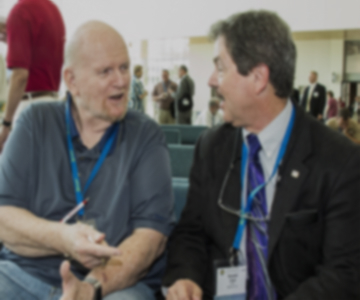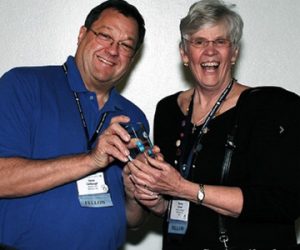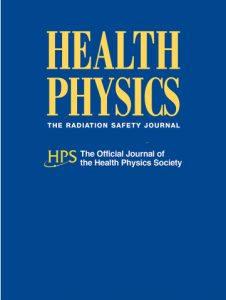1939 — 2006
by Ruth E. McBurney, CHP, and Joel O. Lubenau, CHP

Greta Joy Dicus, a radiation biologist and former NRC (Nuclear Regulatory Commission) Commissioner, passed away in Rockville, Maryland, 30 August 2006. A native of Arkansas, she completed her undergraduate and graduate degrees in Texas, earning a bachelor of arts degree in biological sciences from the Texas Woman's University and a master's degree in radiation biology from the University of Texas Southwestern Medical School. For 16 years, she participated in research on radiation health effects at the Southwestern Medical School, Rice University, and Harvard Medical School. The research included investigations into the effects of ionizing radiation on tissues in in-vivo and in-vitro systems and repair of ultraviolet light-induced damage to mammalian cells. She taught courses in biology, anatomy, physiology, and radiobiological laboratory techniques. Among her academic honors was election to Sigma Xi.
In 1980, she moved to the Arkansas radiation control program, in Little Rock. Also on the staff at the time was Health Physics Society (HPS) Past President Ruth McBurney. When applying for the health physicist position with the Arkansas program, Greta told Ruth that she needed to work in order to buy a new horse trailer and equipment for her hobby, raising Arabian horses. Greta definitely stayed longer than the time needed to get a new trailer for her horses. Ruth later left to join the Texas radiation control program where she is now manager of the Radiation Safety Licensing Branch. Greta remained in Little Rock, working in progressively responsible positions, becoming program director in 1986. Concurrently, she served as Arkansas' Commissioner to the Central Interstate Low-Level Radioactive Waste Commission from 1987 through 1995 and chaired the Commission from 1991 to 1993.
Greta served as chair of the Organization of Agreement States (OAS) in 1990. In 2003 she received the Conference of Radiation Control Program Directors' Gerald S. Parker Award of Merit and in 2005 the OAS Hall of Fame Award. A member of the HPS since 1985, she served as president of the Arkansas Chapter in 1993.
In 1993, President Bill Clinton nominated Greta to the Board of Directors of the United States Enrichment Corporation. Later, she was nominated by President Clinton as Commissioner of the NRC, serving two terms from 1996 to 2003. The President designated her chairman of the NRC effective 1 July 1999, serving until Nils Diaz was sworn in as Commissioner and succeeded her as chairman. While Commissioner, Greta served as the NRC representative to the Joint Coordinating Committee for Radiation Effects Research (JCCRER). The JCCRER was initiated following NRC Commissioner Gail de Planque's 1992 letter to the State Department pointing out a unique opportunity for joint radiation health effects research by scientists from the two countries, particularly at the Russian nuclear weapons facilities at Mayak. In 1996, as part of the first visit by the JCCRER to Russia, Greta visited Mayak, the Biophysics Institute in Ozyorsk, and Urals Research Center in Chelyabinsk before traveling to Moscow where the JCCRER met to approve research plans.
Greta was named to the Main Commission of the International Commission on Radiation Protection, serving from 2001 to 2005. Following the end of her second term as NRC Commissioner, Greta remained active, becoming engaged in a variety of consulting activities.
While in Little Rock, Greta lived on a family farm near her father and brother's family. She loved to fish and when she joined the NRC, she moved her Arabian horses, stabling them at a farm in upper Montgomery County. She was acquainted with guns, as officials at a training facility for security personnel employed by nuclear facilities learned. During the site visit, she was offered an opportunity to shoot at the target range. After carefully checking out the weapon, she plugged the target dead center on the first shot and handed the gun back. Needless to say, she made an impression.
Her administrative and organizational skills were considerable and well appreciated by her staffs. They were severely tested during her term as chairman of the Central Interstate Low-Level Radioactive Waste Commission. She assumed the position following a scandal when the former executive director of the compact was convicted of stealing $700,000 from the agency. The political consequences were considerable. Under her leadership, the Commission revised its operating procedures and took other steps to restore public confidence. A person close to the compact remarked, "She has demonstrated skill in diplomacy that I personally would not have been capable of."
The second health physicist to serve as NRC Commissioner (Gail de Planque was the first), Greta brought to the Commission a deep understanding of state perspectives on national radiation control issues. During her tenure on the Commission, the Integrated Materials Performance Evaluation Program, which involved both NRC and Agreement State staff in evaluations of NRC Regional Offices and Agreement States, was implemented. In addition, the NRC and Agreement States formed a working group and pilot projects to determine how the NRC and states could better work together as partners in a National Materials Program. Agreement State staff took a more active role in NRC rulemaking during this time than had occurred in the past.
Greta leaves behind many family members and friends who will miss her leadership, quick wit, broad smile, and dedication to public service and radiation protection.






